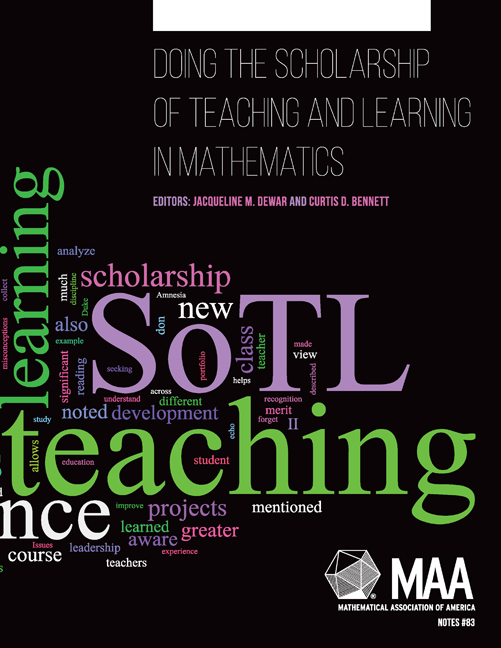Book contents
- Frontmatter
- Contents
- Foreword
- Preface
- Part I Getting Started in SoTL as a Mathematician
- Part II Illustrations of SoTL Work in Mathematics
- Theme 1: Experiments with Approaches to Teaching
- Theme 2: Crafting Learning Experiences around Real-World Data or Civic Engagement
- Theme 3: Using Assigned Reading Questions to Explore Student Understanding
- 13 Conceptual or Computational? Making Sense of Reading Questions in an Inverted Statistics Course
- 14 An Investigation Into the Effectiveness of Pre-Class Reading Questions
- Theme 4: Exploring Student Understanding of the Nature of Mathematics
- Theme 5: Tackling Large Questions
- Epilogue
- Index
14 - An Investigation Into the Effectiveness of Pre-Class Reading Questions
from Theme 3: - Using Assigned Reading Questions to Explore Student Understanding
- Frontmatter
- Contents
- Foreword
- Preface
- Part I Getting Started in SoTL as a Mathematician
- Part II Illustrations of SoTL Work in Mathematics
- Theme 1: Experiments with Approaches to Teaching
- Theme 2: Crafting Learning Experiences around Real-World Data or Civic Engagement
- Theme 3: Using Assigned Reading Questions to Explore Student Understanding
- 13 Conceptual or Computational? Making Sense of Reading Questions in an Inverted Statistics Course
- 14 An Investigation Into the Effectiveness of Pre-Class Reading Questions
- Theme 4: Exploring Student Understanding of the Nature of Mathematics
- Theme 5: Tackling Large Questions
- Epilogue
- Index
Summary
Editors' Commentary
In this chapter Mike Axtell and William Turner describe how they went about undertaking, as novices, a literature review in mathematics education. Their experience revealed to them the critical role that the literature review can play in refining a SoTL research question and how it can aid in designing a study. Readers may want to contrast their study of reading questions with that written by Derek Bruff in the preceding chapter.
The Backstory
We begin by providing the background of our investigation. We describe what motivated us to use pre-class reading assignments and how over time we developed a system that involved not just assigned readings but reading questions (RQs) as well. We explain why we decided to investigate their use and what it was that we wanted to know, at first.
The process of reading a mathematical text and understanding it is complicated and difficult (Konior, 1993; Reiter, 1998). It is an acquired skill that few, if any, come by naturally. However, it is one that mathematicians must learn. Mathematics conferences and pedagogical publications often contain ideas on how to get, or teach, students to read mathematics (Amick, 1997; Gold, 1998; King, 2001; Ratliff, 1998; Reiter, 1998; Taalman, 1998), and there are hundreds of references on how to help students improve their critical reading skills (Bratina & Lipkin, 2003). The goal is for students to become independent learners capable of teaching themselves, perhaps the ultimate goal of any liberal education program.
If we as teachers are convinced of the need to get students to read a mathematical text, we should then be concerned with determining what our students are gaining, and not gaining, from this task. If our strategies are not leading to desired outcomes, then we should rethink them. This observation led us to collaborate on a SoTL project during the 2005-2006 academic year that focused on student reading.
- Type
- Chapter
- Information
- Doing the Scholarship of Teaching and Learning in Mathematics , pp. 137 - 142Publisher: Mathematical Association of AmericaPrint publication year: 2014

